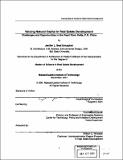| dc.contributor.advisor | Fred Moavenzadeh. | en_US |
| dc.contributor.author | Seal Uncapher, Jenifer L. (Jenifer Laura), 1970- | en_US |
| dc.contributor.other | Massachusetts Institute of Technology. Dept. of Architecture. | en_US |
| dc.date.accessioned | 2005-08-23T18:10:47Z | |
| dc.date.available | 2005-08-23T18:10:47Z | |
| dc.date.copyright | 2001 | en_US |
| dc.date.issued | 2001 | en_US |
| dc.identifier.uri | http://hdl.handle.net/1721.1/8192 | |
| dc.description | Thesis (S.M.)--Massachusetts Institute of Technology, Dept. of Architecture, 2001. | en_US |
| dc.description | Includes bibliographical references (p. 87-103). | en_US |
| dc.description.abstract | The challenging economic, social, and political issues that face the Pearl River Delta region of south China make it different from any other area of the world. With the clash of such dynamic elements and a desire for rapid expansion, the environment there has suffered greatly. The forces of change within the delta, unleashed by the open economic policies of the late 1970s, have caused a staggering amount of development and industrialization, while the methods to control its impact are still evolving. The recent reunification of Hong Kong and Macao into China and the impending entrance of the country into the WTO bring new challenges. As the center of economic transformation, the region has become the nation's gateway to the outside world and is seeking to keep its competitive edge as other coastal regions open up. A cleaner environment is beginning to be seen as part of this competitive edge. The region has tremendous potential for giving its economy and society ecological orientation. Only a more systematic, integrated view will enable this region to innovate for long-term profitability and sustainability. A strategy that values natural capital can bring competitive advantage. Natural capitalism is a powerful new business model that integrates business and environmental motives. Through this model, businesses can better satisfy their customers' needs, increase profits, gain competitive advantage, and help solve environmental problems, all at the same time. As currently practiced, the real estate business does not place value on natural capital. Green development is the vehicle through which natural capitalism can be practiced in real estate development. In the context of the natural capitalism model, this thesis explores the emerging financial, social, and ecological benefits of green development and the applications of it in the Pearl River Delta. A vast array of information on green development has emerged over the last ten years. Hundreds of such projects are pushing the envelope and realizing tremendous benefits with the advancement of knowledge and technology in green building. This thesis presents leading international case studies and research in green building, including activities underway in south China. Challenges that currently impede the adoption of such practices in the region are identified and opportunities that could help bring about such positive development are explored. | en_US |
| dc.description.statementofresponsibility | by Jenifer L. Seal Uncapher. | en_US |
| dc.format.extent | 105 p. | en_US |
| dc.format.extent | 10261120 bytes | |
| dc.format.extent | 10260881 bytes | |
| dc.format.mimetype | application/pdf | |
| dc.format.mimetype | application/pdf | |
| dc.language.iso | eng | en_US |
| dc.publisher | Massachusetts Institute of Technology | en_US |
| dc.rights | M.I.T. theses are protected by copyright. They may be viewed from this source for any purpose, but reproduction or distribution in any format is prohibited without written permission. See provided URL for inquiries about permission. | en_US |
| dc.rights.uri | http://dspace.mit.edu/handle/1721.1/7582 | |
| dc.subject | Architecture. | en_US |
| dc.title | Valuing natural capital in real estate development : challenges and opportunites in the Pearl River Delta, P.R. China | en_US |
| dc.type | Thesis | en_US |
| dc.description.degree | S.M. | en_US |
| dc.contributor.department | Massachusetts Institute of Technology. Department of Architecture | |
| dc.identifier.oclc | 50073358 | en_US |
